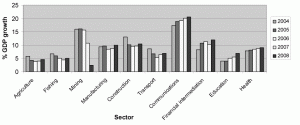Economic stimulus package
President Kikwete announced on June 10 a Shs 1.7 trillion economic stimulus package designed to mitigate the effect of the global financial crisis. He said that the crisis had adversely affected many areas including exports, tourism, manufacturing and agriculture. He said that the world was facing the worst economic crisis since the 1930s, but the government would do everything possible to absorb the shocks. Among the measures included were the off-setting of the Shs 21.9 bn loss suffered by several firms and co-operative unions involved in crop buying. On firms which had borrowed over Shs 270 bn for construction of hotels and in other areas, the government would guarantee the debts and ask bankers to extend the repayment schedule by two years. Shs 80 bn would go to recapitalizing firms with inadequate working capital and Shs 20 bn to boost export and small and the medium entrepreneurs guarantee schemes plus Shs 20 bn to the Tanzania Investment Bank (TIB) to enhance its capacity to extend loans. To support gemstone dealers who could not sell diamonds, tanzanite and other precious stones abroad, they would be exempted from payment of royalty for two years. – Daily News
THE ECONOMY AND THE BUDGET
During the budget session in Parliament Finance Minister Mustafa Mkulu reviewed the state of the economy. He forecast a significant fall in revenue because of the global financial crisis and said that the Government would borrow funds from the domestic market, although he hoped that donors, would increase their support through loans and grants by 30% compared with the previous year.
The economy of Tanzania is estimated to have attained GDP growth of 7.4% during the year 2008 (7.1% in 2007). The annual rate of inflation for 2008 was 10.3% (7% in 2007.) The rate of inflation reached 13% by the end of March 2009.
The 2009/10 budget sets out the following targets:
• GDP growth rate of 5% in 2009;
• inflation at below 10% by end of June 2010;
• increase in domestic revenue from 15.9% of GDP in 2008/09 to 16.4% in 2009/10;
Total budget revenues will be as follows (Shs mn):
• Domestic revenue 5,096
• grants and loans 3,181
• domestic loans 1,082
• local government collections 138
• privatisation proceeds 15
Total Revenue 9,513
Donor dependency is expected to grow due to the economic crisis reaching 45% of the 2009/10 budget.
The Government is proposing to spend Shs 9,513 billion in 2010/11: Recurrent 6,688, development 2,825. Total: 9,513 in the following areas: Education 18.3%; agriculture 7%; infrastructure 11.5%; health 10.1%; water 3.7%; energy and minerals 3%;
Tourism and gold receipts continued to dominate the export sector accounting for 27% and 18% respectively.
Foreign reserves increased by 3.9 % to US$ 2,869.7 million in 2008, enough to cover 5 months of imports.
As at 31 December 2008, the national debt had increased by 7% at $ 6,329 million – 32.6% of total GDP.
The budget included provision for:
– the immediate abolition of 405 government notices issued between 1964 and 2005;
– a reduction in local Government taxes to 3% from the previous 5%;
– a number of measures to ease widespread concerns that Tanzania isn’t getting a fair return on foreign investments in gold mining including the removal of VAT special relief and limiting it to cover only prospecting and exploration; abolition of exemption from taxes on fuel for mining companies, other than fuel levy exemptions in existing mining development agreements;
– a reduction in the VAT rate from 20% to 18% and a 7.5% increase in excise tariffs on alcohol, tobacco and carbonated drinks;
– in the tourism sector the removal of VAT exemption on air charters, balanced by a removal of import duty on 4-wheel drive vehicles specifically designed for tourist purposes, and some rationalisation of visa costs;
– removal of import duty on pharmaceuticals.
– to encourage companies to list on the Dar es Salaam Stock Exchange a reduction in the corporate tax rate for companies from 30% to 25%;
– PricewaterhouseCoopers Newsletter.
Criticism
There was such strong criticism from religious leaders of the proposal to lift tax exemptions enjoyed by religious and other non-governmental institutions providing services like education, health and water that on June 17 the Prime Minister announced, at an emergency news conference, that this part of the budget would be cancelled – Guardian.

